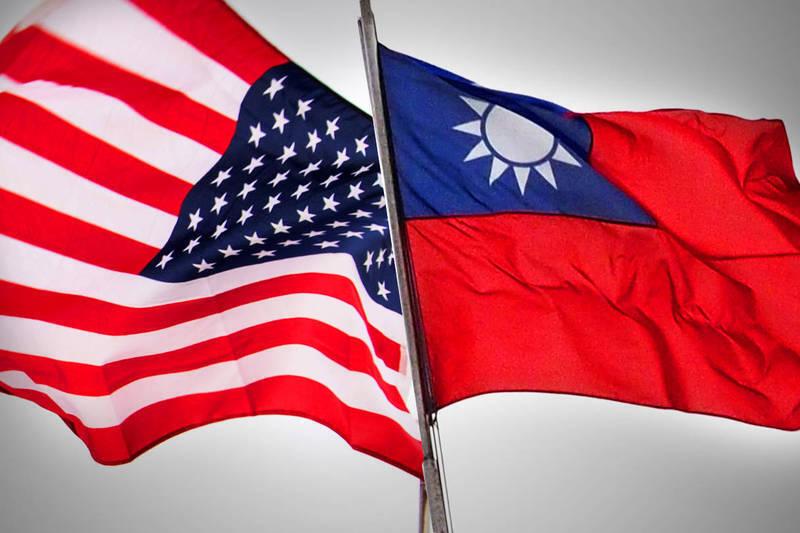The US House Financial Services Committee on Wednesday approved a bipartisan bill to support Taiwan's admission into the IMF.
The bill, introduced last month by US representatives Young Kim and Al Green, calls for the US government to support Taiwan's admission into the IMF as a member and participation in the financial institution's regular surveillance activities relating to its economic and financial policies.
In addition, the bill urges the US government to support IMF employment opportunities for Taiwanese, and for Taiwan to receive IMF technical assistance and training.

Photo: AFP
Before the bill passed, Kim said that the US had long supported Taiwan's inclusion in international organizations and advocated for a mechanism to ensure its voice is heard when full membership is not possible.
"This principle has endured for decades across the Republican and Democratic administrations, and has repeatedly been reaffirmed in bills passed by this Congress," Kim said. “My bill is straightforward. It requires the [US] Treasury Department to implement our Taiwan policy at the International Financial Fund or the IMF. As the legislation makes it clear, Taiwan is not required to be a member of the United Nations to gain membership in the IMF."
Kim cited Kosovo as an example, saying that the country is not a member of the UN, but has been an IMF member for more than a decade.
She said it would be "absurd" for the organization to exclude Taiwan, one of the US' top 10 trade partners and the fifth-largest foreign exchange reserve holder in the world.
"At a time when China has been threatening the work of the IMF through its non-transparent lending abroad and its lack of cooperation with other creditors, we must focus the fund on effective international cooperation," Kim said.
"That means openness toward potential members like Taiwan that can make significant contributions to the IMF's mission," she added.
The push for Taiwan to join the IMF could pave the way for it to join other international financial institutions such as the World Bank, which requires countries to first be members of the IMF, she said.
The US Senate Foreign Relations Committee has expressed bipartisan support for Taiwan's membership in the Inter-American Development Bank, which would be possible if Taiwan was an IMF member, Kim said.
The bill says that although Taiwan is not an IMF member, it has membership in the WTO, the Asian Development Bank and the Asia-Pacific Economic Cooperation trade bloc.
The bill cited the Taiwan Relations Act as saying that "nothing in this act may be construed as a basis for supporting the exclusion or expulsion of Taiwan from continued membership in any international financial institution or any other international organization."
The IMF, which has 191 members, promotes global financial stability and economic growth by providing financial assistance, policy advice and economic surveillance to members.

Chinese spouse and influencer Guan Guan’s (關關) residency permit has been revoked for repeatedly posting pro-China videos that threaten national security, the National Immigration Agency confirmed today. Guan Guan has said many controversial statements in her videos posted to Douyin (抖音), including “the red flag will soon be painted all over Taiwan” and “Taiwan is an inseparable part of China,” and expressing hope for expedited reunification. The agency last year received multiple reports alleging that Guan Guan had advocated for armed reunification. After verifying the reports, the agency last month issued a notice requiring her to appear and explain her actions. Guan

GIVE AND TAKE: Blood demand continues to rise each year, while fewer young donors are available due to the nation’s falling birthrate, a doctor said Blood donors can redeem points earned from donations to obtain limited edition Formosan black bear travel mugs, the Kaohsiung Blood Center said yesterday, as it announced a goal of stocking 20,000 units of blood prior to the Lunar New Year. The last month of the lunar year is National Blood Donation Month, when local centers seek to stockpile blood for use during the Lunar New Year holiday. The blood demand in southern Taiwan — including Tainan and Kaohsiung, as well as Chiayi, Pingtung, Penghu and Taitung counties — is about 2,000 units per day, the center said. The donation campaign aims to boost

The Kaohsiung Tourism Bureau audited six hotels in an effort to prevent price gouging ahead of Korean band BTS’ concert tour in the city scheduled for Nov. 19, 21 and 22 this year. The bureau on Friday said that the audits — conducted in response to allegations of unfair pricing posted on social media — found no wrongdoing. These establishments included the local branches of Chateau de Chine, Hotel Nikko, My Humble House, and Grand Hai Lai, it said, adding that the Consumer Protection Commission would have penalized price gougers had the accusations been substantiated. The bureau said the Tourism Development Act

The Central Weather Administration (CWA) said a magnitude 4.9 earthquake that struck off the coast of eastern Taiwan yesterday was an independent event and part of a stress-adjustment process. The earthquake occurred at 4:47pm, with its epicenter at sea about 45.4km south of Yilan County Hall at a depth of 5.9km, the CWA said. The quake's intensity, which gauges the actual effects of a temblor, was highest in several townships in Yilan and neighboring Hualien County, where it measured 4 on Taiwan's seven-tier intensity scale, the CWA said. Lin Po-yu (林柏佑), a division chief at the CWA's Seismological Center, told a news conference